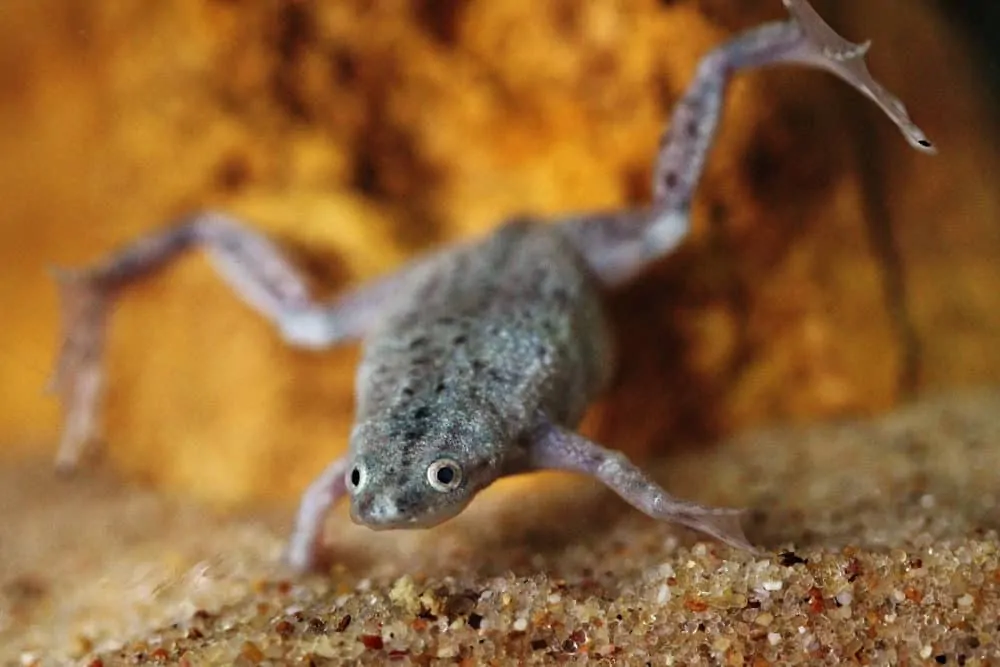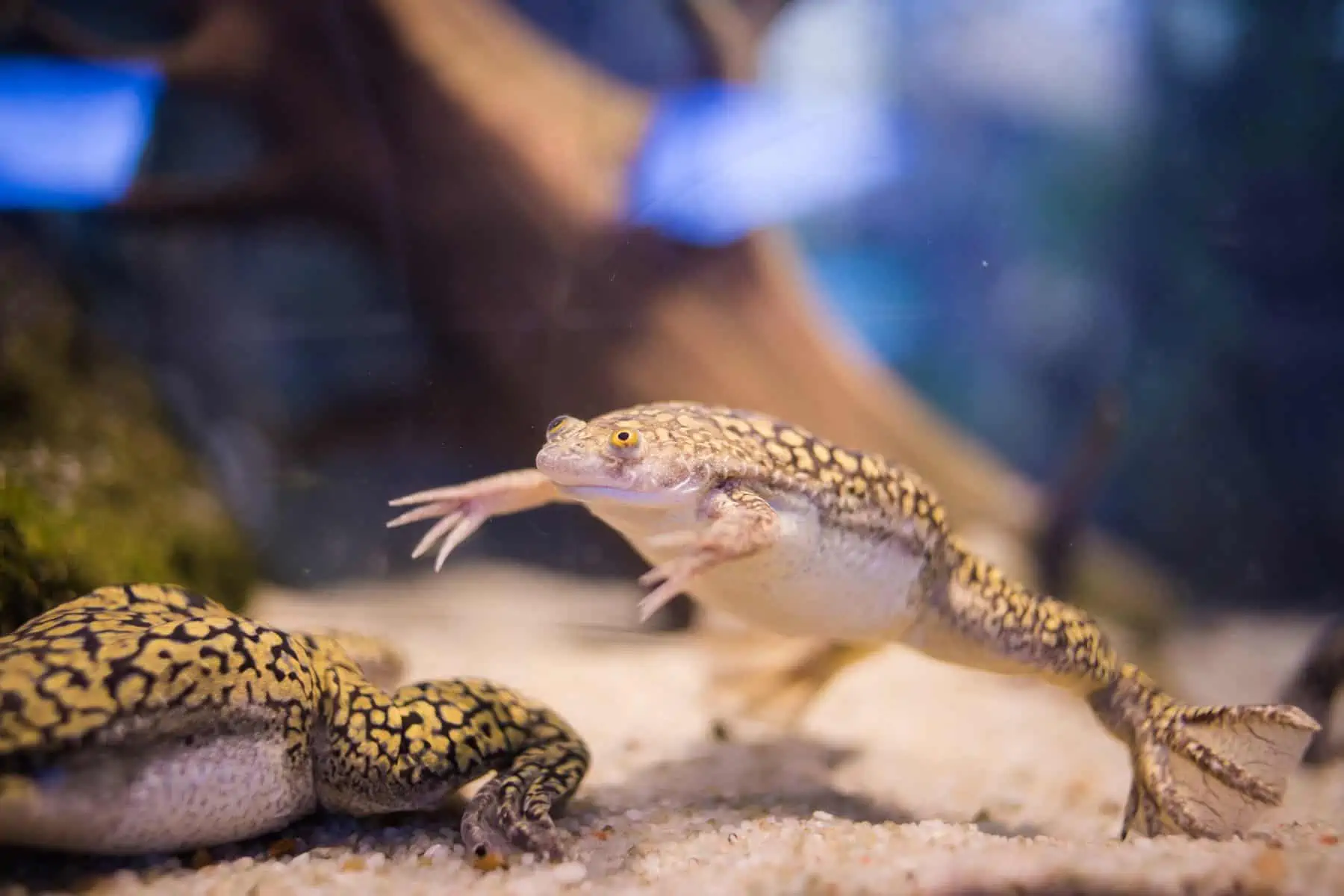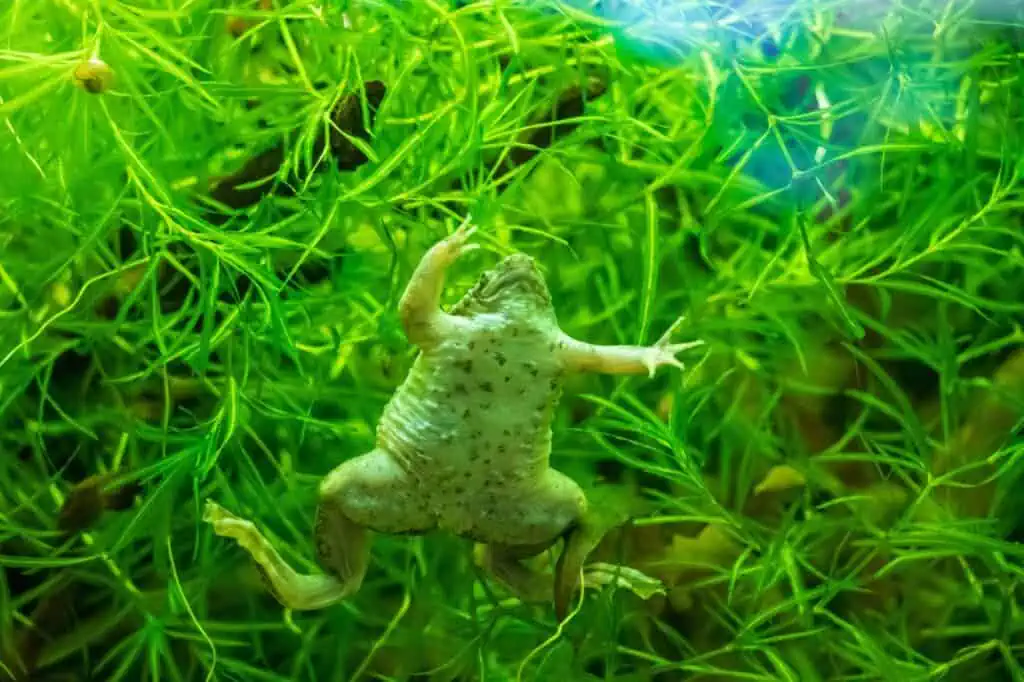You may have heard that aquarium frogs are peaceful creatures that can be kept in community tanks. So why are you seeing your frogs biting each other?
While the ever-popular African dwarf frog is a docile, social species, there are other frogs that are downright aggressive and will bite anything that they can fit in their mouths – including their owner’s fingers!
Sadly, frog species are sometimes mislabeled in pet stores, and some behaviors in frogs are more innocent than they look.
Let’s chew on this a bit together!
African Dwarf Frogs are Small and Peaceful
Firstly, it’s important to know that African dwarf frogs (Hymenochirus species) are an overwhelmingly peaceful and docile family that will almost always avoid conflict if they can!
Although African dwarf frogs are predatory, they only grow up to 2.5 inches long (very rarely up to 3 inches) meaning they don’t pose much threat to most aquarium fish, or other frogs.
If you’ve seen African dwarf frogs biting each other, it probably wasn’t out of aggression. These social creatures are used to spending time together and are very unlikely to try to fight each other.
Reasons Your African Dwarf Frog May Bite Another Frog

Since aggression is very unlikely to be the cause of a biting incident, we need to find other reasons that your dwarf frogs might be biting one another.
Poor Eyesight
Have you noticed how your African dwarf frog seems to stare blindly at you with those big, bulging eyes? Well, the reason is that they are fairly blind!
African dwarf frogs are notorious for having very poor vision, meaning they can’t even see what’s swimming in front of them very clearly. In the wild, African dwarf frogs mostly live on a diet of insects, worms, and other invertebrates.
If they see something flash by in front of them, they may think that their lunch is swimming by and lunge out to bite it. In reality, this could be an aquarium fish or another frog’s leg. Luckily, since they don’t have teeth, they’re unlikely to do much harm with their oral assault!
Mating
Frogs are frisky creatures, and they’re rarely seen so animated as during their courtship rituals.
During mating, the male will climb on top of the female and ‘clasp’ her underneath with his front legs in an embrace called ‘amplexus’.
During this time, the frogs may swim together clumsily through the water and may appear like they’re fighting or wrestling. In reality, this is simply the nature of their mating behavior.
From my experiences observing frogs, I wouldn’t be surprised if a female might give a warning bite in response to the unwelcome advances of a pushy male. Since dwarf frogs don’t have teeth, however, the bites are unlikely to cause any serious harm.
Eating Skin That’s Been Shed
Did you know that African dwarf frogs shed their skin? They do this every 2-4 weeks, especially frequently when they’re growing.
To recycle the nutrients in the dead skin, your pet frogs will eat the skin that they’ve just shed. Not only that, but their friends may sometimes join the party!
It’s not uncommon to see more than one frog eating skin that’s being shed, but don’t mistake this behavior for your frogs biting each other. Your frog’s friends are merely enjoying the tasty task of discarding and recycling their pal’s old outfit that’s not needed anymore!
You Have an African Clawed Frog, Not an African Dwarf Frog!

When they’re young, African dwarf frogs (Hymenochirus spp.) and African clawed frogs (Xenopuslaevis spp.) can look very similar, but the likeness is only superficial!
Whereas African dwarf frogs never exceed 3 inches, African clawed frogs can grow up to 5 inches long and are much more aggressive!
This makes all the difference when choosing your frog because, while African dwarf frogs are model community tank members, African dwarf frogs are fierce predators which are often best kept alone!
How To Tell the Difference Between an African Dwarf Frog and an African Clawed Frog?
Since pet stores sometimes mistakenly sell hobbyists African clawed frogs instead of African dwarf frogs, you must know the difference between them so you don’t go home with the wrong frog!
The biggest difference between the two species is that whereas all feet of the African dwarf frogs are webbed, African clawed frogs only have webbing on their back feet, but not on the front.
In addition, dwarf frogs have a more flattened shape and a more pointed head.
Do African Clawed Frogs Bite Each Other?
Now, if you’ve realized you have an African clawed frog instead of a dwarf frog, bad news. Do they bite each other? Yes. And they’ll also bite and try to eat almost anything else in the tank, too!
At 5 inches long, adult African dwarf frogs are formidable predators and may take on all but the largest aquarium fish.
If your pet store sold you African clawed frogs mislabeled as African dwarf frogs, try to take them back and demand a refund. These two species require a totally different tank setup and care, and mustn’t be confused.
Other Pet Frogs That Bite
Since we’re an aquarium website, I’ve focused more on fully aquatic frogs that can live in fish tanks. If you have a terrarium, vivarium, or paludarium, however, you may be keeping other types of frogs.
While there are many types of pet frogs, with different temperaments, there are a few species that are especially renowned for biting!
Do Pacman Frogs Bite?
Pacman frogs are probably the most notorious biters of the frog family. These fierce amphibians have huge mouths lined with teeth and an incredibly powerful bite for their size!
Since owners of Pacman frogs regularly get their hands bitten, the only safe way to feed them is with a pair of wooden tongs or chopsticks (metal may damage their mouths).
While some owners have tried keeping more than one Pacman frog together, these carnivorous frogs will think nothing of eating a smaller Pacman frog or any other smaller frog that you put in their tank with them!
Do Budgett’s Frogs Bite?
Another frog with a fearsome reputation is the bizarre-looking Budgett’s frog. These critters have enormous mouths for their size and won’t hesitate to bite their owner’s hands or other frogs in their vicinity. Like Pacman frogs, they’re also cannibalistic.
Definitely, a frog best left to advanced hobbyists and professionals!
Do African Bullfrogs Bite?
The enormous African bullfrog can grow to a whopping 10 inches long and live for over 20 years! More of a battleship than a cute amphibian, these guys can turn on reptiles, fish, other frogs, and even small birds, and mammals for food!
While they may seem like impressive pets, these fierce predators can pack a punch with their bite and should be left to experienced or professional amphibian keepers only.
Peaceful Pet Frog Species That Don’t Bite
After hearing all about the aggressive frogs that might try to lunge at your hands or each other, you may be disheartened, wishing there were frogs that you could keep peacefully.
The good news is that there are many. Tree frogs and leaf frogs are small, delicate amphibians that are relatively harmless. Even though they might bite in self-defense if provoked enough, they are so small that their bites would feel more like a harmless peck.
Is It Safe To Handle Pet Frogs?
One of the reasons you may be looking for a peaceful frog is when you have the wish to handle them. While peaceful frog species like tree frogs won’t bite you, remember that your hands could still damage them!
Because frogs have such delicate skin, they shouldn’t be handled too often. Consider wearing rubber gloves if you want to handle your frog, and always hold them in a safe place where they can’t fall too far if they suddenly jump!
Of course, poisonous frogs with poisonous skin are an exception. Poison dart frogs for example can poison your skin with serious effects!
Frog Biting FAQs
Can an African Dwarf Frog Bite a Betta Fish?
As I’ve explained, African dwarf frogs are peaceful creatures that only tend to feed on small prey items. Occasionally, however, they may bite other types of fish that swim past.
Luckily, most aquarium fish species are plenty tough enough to resist the toothless bite of this tiny frog, but that doesn’t mean that fish with fancy fins won’t get damaged.
Betta fish are particularly vulnerable, and it’s also not impossible that your dwarf frog could also bite an aggressive fish in self-defense!
How Hard Can a Frog Bite?
Studies measuring the strength of the South American horned frog bite found that this remarkable creature could bite at a force of 30 Newtons. That’s the equivalent of having three liters of water balanced on the end of your fingernail!
If we scaled these frogs up to the size of predatory mammals, their bite would be in a similar league to that of lions and wolves. That means around 75% harder than the human bite!
Does a Frog Bite Hurt, Is It Dangerous?
Although frogs can bite down pretty hard for their size, frog teeth are not very sharp, and their bites are rarely dangerous.
Even frogs with small teeth will rarely draw blood, although larger frogs like African bullfrogs are capable of inflicting a painful bite that may be shocking, especially to young children.
Are Frog Bites Poisonous or Venomous?
Although some amphibians like the poison dart frog have poisonous skin, scientists are yet to discover any frogs with a venomous bite.
That doesn’t mean that they will never be found though! As recently as 2015, scientists in the Amazon discovered two species of venomous frogs that use spines in their noses to headbutt and inject venom into would-be predators when threatened!
Luckily, neither Bruno’s casque-headed frog (Aparasphenodon brunoi) nor Greening’s frog (Corythomantis greeningi) are often kept in captivity, but this remarkable discovery makes for fascinating reading. Check out the full article on the British National History Museum’s website!
Conclusion
African dwarf frogs are a very peaceful species of frog that would almost never bite each other willfully.
The easily confused African clawed frogs, however, are much more aggressive creatures that will attack and eat not only other frogs but fish and invertebrates, too!
Along with these two commonly kept aquarium frogs, several vivarium frogs are capable of biting each other, as well as their owner’s hands!
To find the ultimate tank mates for your African dwarf frog, check out our dedicated guide here!


